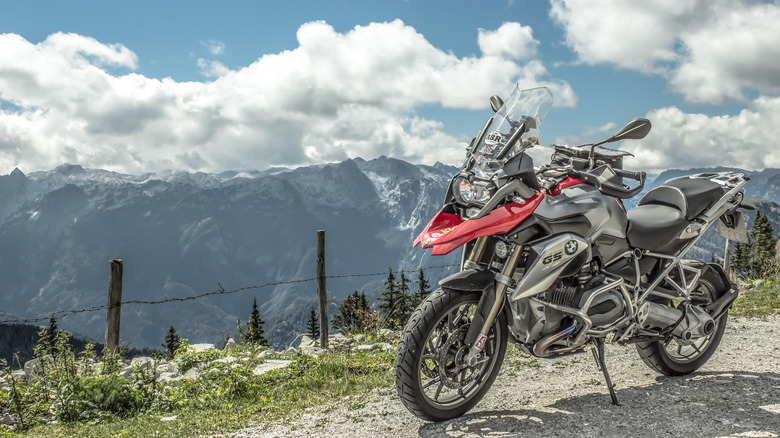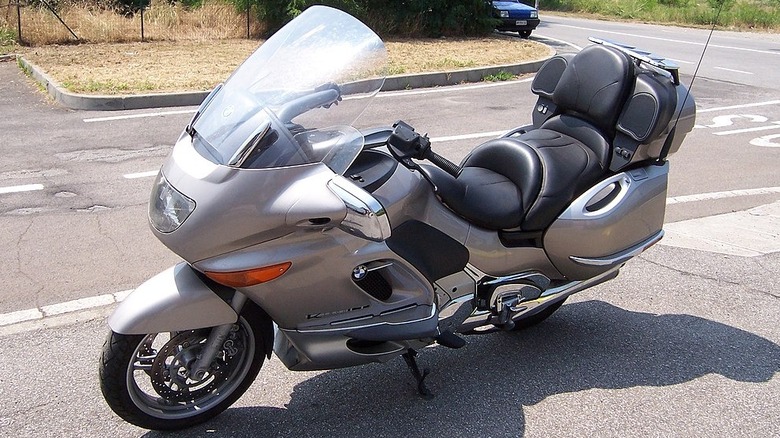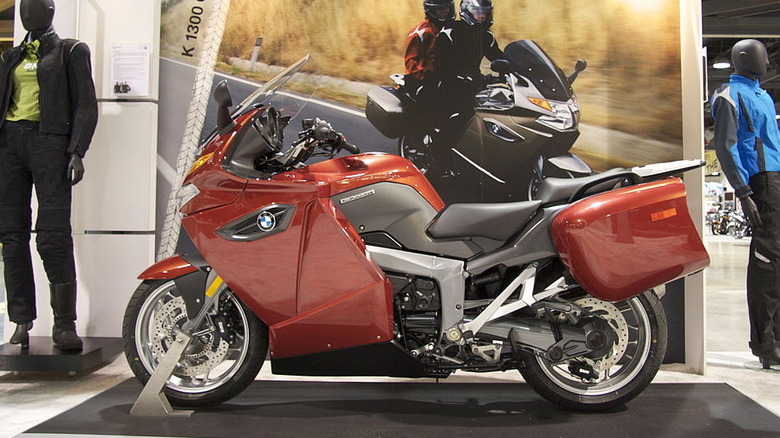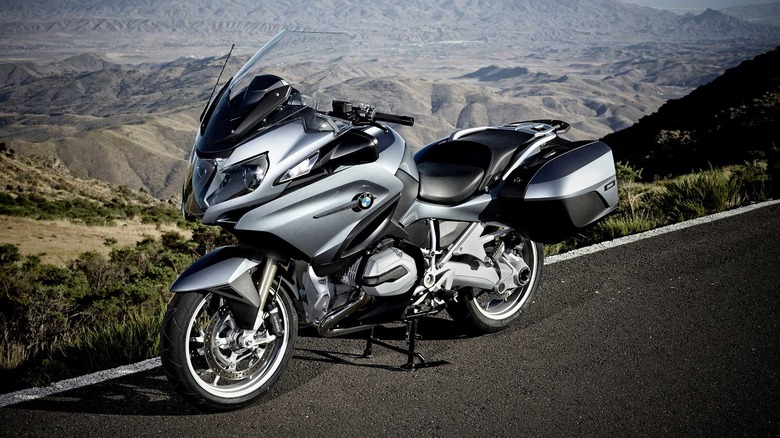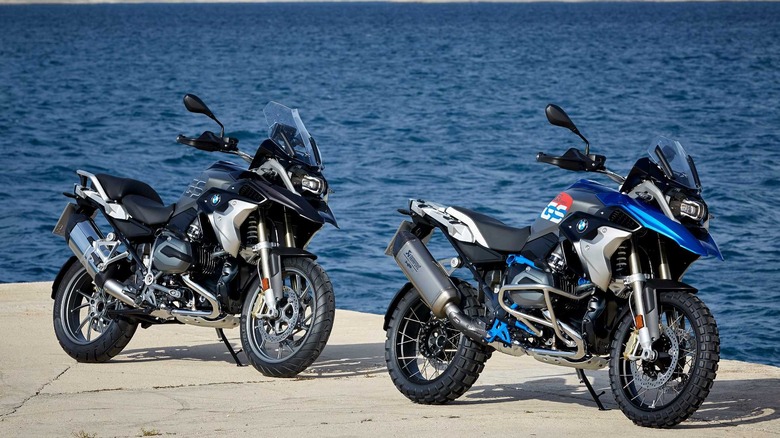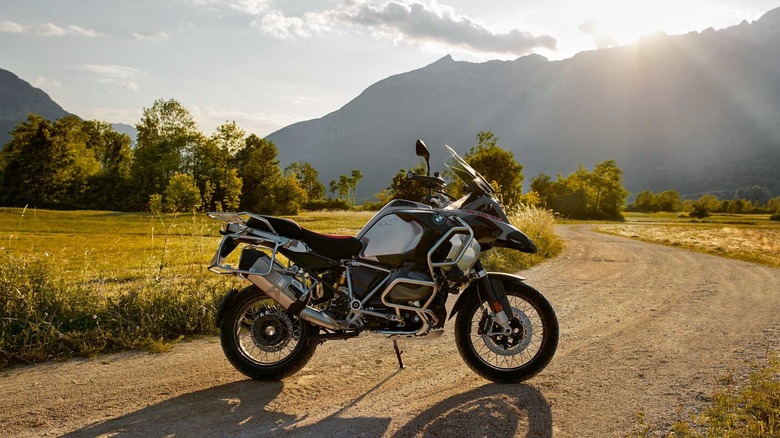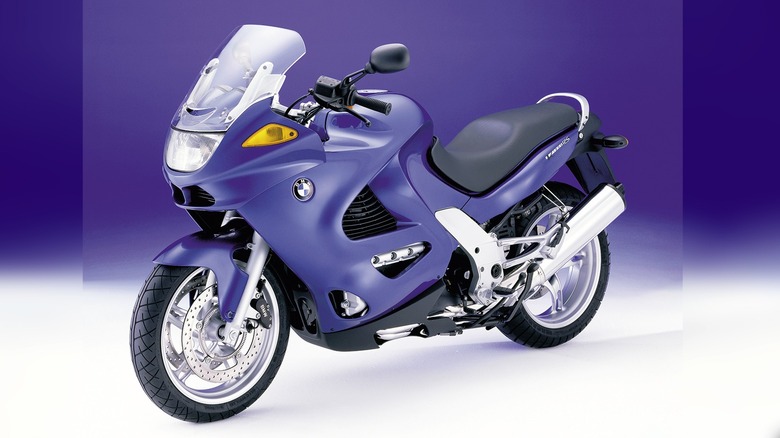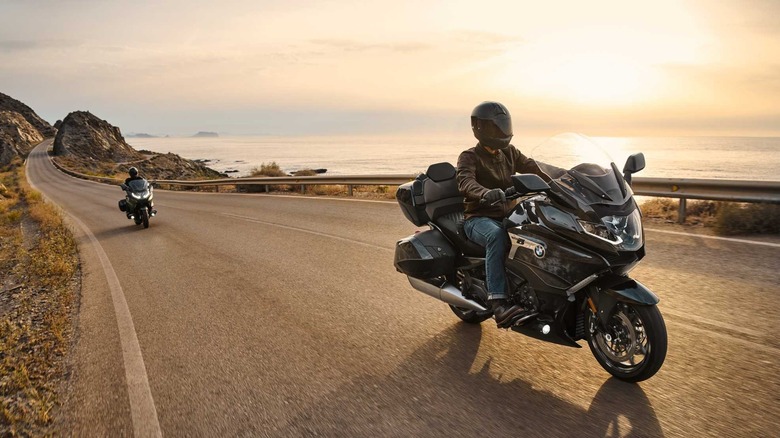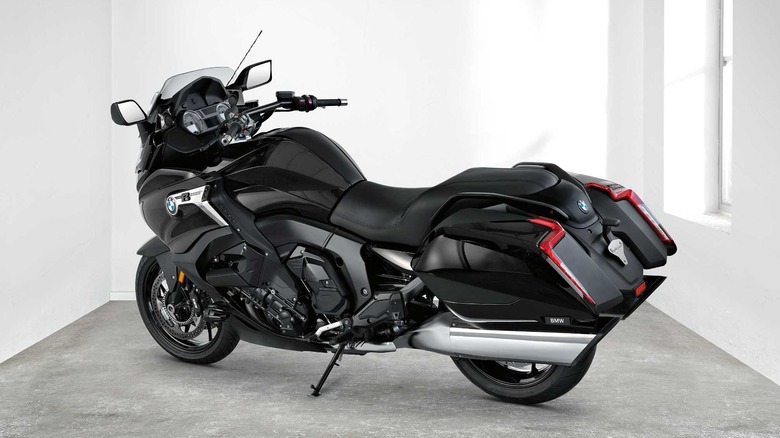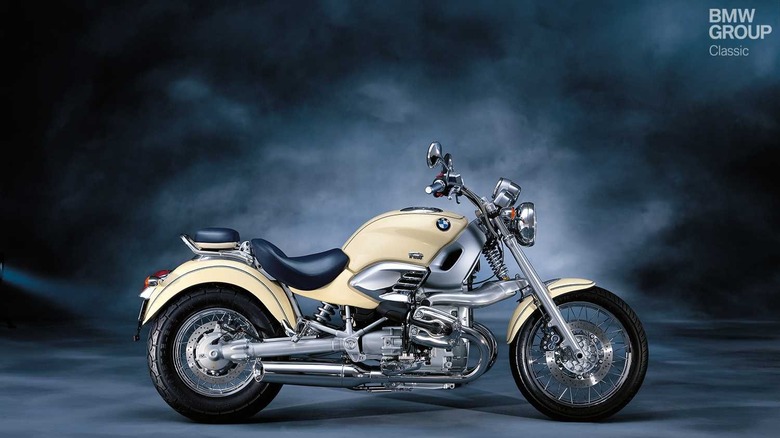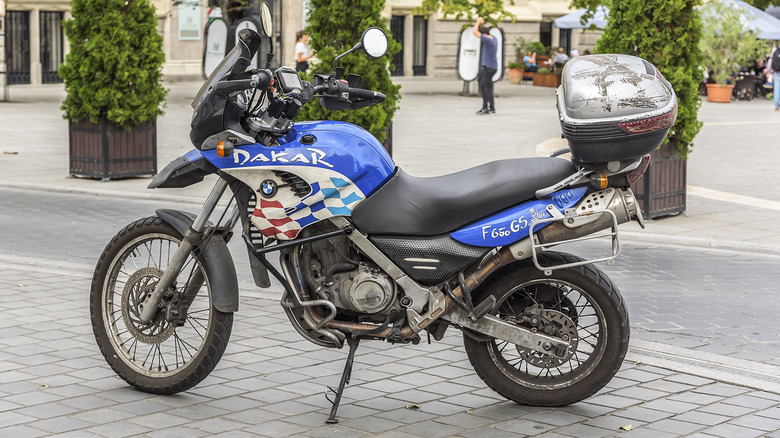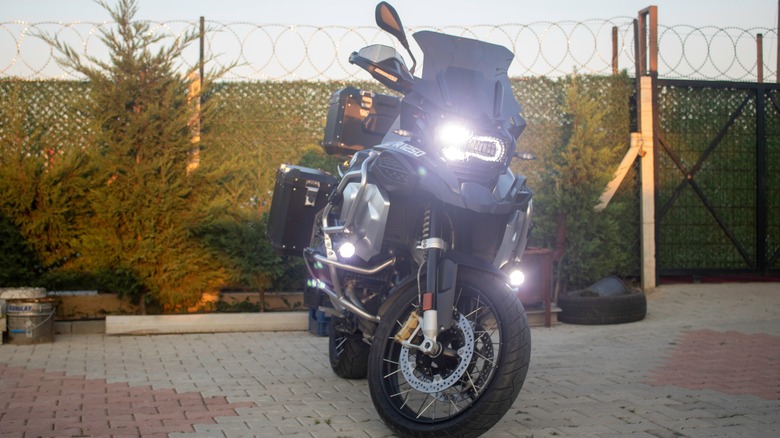10 Used BMW Motorcycle Models You Should Steer Clear Of At All Costs
In 2015, Consumer Reports declared that 40% of BMW motorcycles failed by the fourth year of ownership. With many motorcycles from that era still on the market, it's unclear how much has changed.
After years of witnessing the trials and challenges that come with owning a BMW motorcycle, my experience makes it clear that owning a Beemer means you expect a super-high level of quality from your bike. I remember my stepdad's frustration when his favorite BMW (an older model that would now be squarely in the vintage camp) kept returning to the shop for the most random fixes. It's not only the 1970s-era Beemers that experience failures these days, either.
A R 1150 RT from the early '00s had its share of issues, and time spent at the shop quickly outweighed on-road hours. Thus, the most important measure of whether a used bike is worth the investment is the odds that you'll have to skip a weekend ride because of an equipment failure.
Judging by the number of complaints and recalls on newer bikes, there are quite a few BMW models you'll want to avoid for this reason. Many classic BMWs are worth a bundle today, but others — even if purchased cheaply — will not exactly appreciate over time.
These used models are best avoided based on issues reported to the National Highway Traffic Safety Administration (NHTSA), plus anecdotal evidence from riders themselves. An in-depth explanation of our methodology will follow the list of used BMW motorcycles to steer clear of.
K 1200 LT
BMW is one of the best major motorcycle brands, known for longevity on the market and high-end accessories, among other things. Yet, not every bike is a home run. The BMW K 1200 LT has received more than its fair share of complaints and recalls, so while it might not be a bad bike, it probably won't get as much road time as other models.
Some owners say the BMW K 1200 LT is hard to maintain, which appears to be supported by the many NHTSA complaints on various years of the model.Specifically, when comparing Goldwings to the K 1200 LT, one owner called the mechanics "upside down and backwards."
Miscellaneous issues frustrate many riders — both on forums and enough to get them to lodge an NHTSA complaint — and it seems everyone has a story about a friend whose 1200 was always in the shop.
Motorcycles do have fewer complaints, in general, than cars, likely due to production numbers. After all, driving a car is far more common than riding a motorcycle (only 3% of vehicles on the road are motorcycles). However, the K 1200 LT has around 100 complaints across various years, including the 2000 and 2002 models.
The top complaints on BMW's K 1200 LT overwhelmingly involved power train problems, with fuel and brake issues trailing far behind. No recalls were listed for the high-complaint K 1200 LT years we examined, but that doesn't equate to fewer hours in the shop, per consumer complaints.
[Featured image by Pil56 via Wikimedia Commons | Cropped and scaled | CC BY-SA 3.0]
K 1300 GT
According to rider owners, BMW's K 1300 GT is another Beemer with a litany of issues. Specifically, the 2009 K 1300 GT had four recalls related to rear wheel linkage, engine stalling, handlebar switch, and brake issues. Per the recall verbiage, all of these issues could cause a crash.
The tens of NHTSA complaints on the 2009 K 1300 GT are largely related to the engine and engine cooling. Many riders reported their engines stalling while driving, with the problem persisting even after repairs at a BMW dealership. BMW's fix on over 2,000 units involved updating the engine management software on the K 1300 GT.
Similar sentiments are echoed by owners in forums, where the topic of hot start and battery issues comes up frequently. Sure, the K 1300 GT is old at this point, but it's not a dinosaur, so riders might be right to expect higher performance. Plus, many complaints were made when the bike was less than five years old.
Although consumers have had plenty of complaints, there is a lot of praise for its handling and performance despite its unwieldy size. Motorcycle News' consumer reviews give the K 1300 GT four out of five stars overall, though some riders considered it comparatively expensive and others called the stock windscreen "simply awful."
A K 1300 GT might not be the worst buying choice these days, but if this Beemer is on your wishlist, the 2009 model year might be the one to avoid.
[Featured image by Stephen Burns via Wikimedia Commons | Cropped and scaled | CC BY 2.0]
R 1200 RT
BMW might have manufactured one of the fastest motorcycles ever built, but it has had a few flops, too. The K 1200 RT is a touring sport bike that first came out in 2005, but there were problems out of the gate. BMW discontinued the K 1200 RT in 2019, despite some rave reviews. On the flip side, many complaints were lodged via the NHTSA and recalls also impacted the K 1200 RT.
NHTSA data shows that the 2006 and 2007 model years of the R 1200 RT had various complaints and recalls. The former had four recalls, while the latter had two, with one shared failure being a possibly leaky fuel pump flange. Brake issues affected both bikes, though the 2006 had more recalls for ABS failures and had a recall for a clutch component problem.
Consumers in casual forums also complained of unexplained failures, cautioning prospective buyers that they could end up with a perfect bike that would hit 100,000 miles easily or, conversely, wind up buying a lemon.
Not only did many riders have complaints lodged per the NHTSA, but an early review of the 2014 R 1200 RT also brought out riders who were unhappy with the review labeling the bike perfect. Cycle World claimed that the 2014 R 1200 RT was "more than" the "best sport-tourer." Still, commenters were quick to bash the testers, pointing out fuel problems, "clunky" behavior, and final drive failures, suggesting riders should steer clear.
R 1200 GS
The R 1200 GS might be one of BMW's most successful bikes, but it isn't without problems. The ultimate adventure motorcycle has had plenty of complaints and recalls over the years — as well as plenty of happy riders. In fact, one caveat to labeling the R 1200 GS one of the worst models to buy used is the fact that a high sales volume could correlate to a higher number of complaints and recalls.
BMW's 2006 R 1200 GS had the most recalls of any BMW bike in our review of NHTSA-documented recalls, with eight total centering on brake issues and fuel system problems. The most far-reaching recall impacted over 16,000 bikes and related to a fuel pump flange leak that increased fire risk.
Despite the relatively high number of recalls, the 2006 R 1200 GS didn't have many complaints, but the same was not true of the 2005 or 2007 models. In its 2005 model year, BMW's R 1200 GS had seven recalls — including the same fuel pump flange leak advisory — with one ABS-related problem impacting over 13,000 bikes.
For 2007 model recalls on the R 1200 GS, there were only four — but one was the fuel pump flange issue. Fuel/propulsion system complaints were the most common in older model years. The news isn't all bad for riders considering this model, though; a newer R 1200 might qualify as one of the most reliable BMWs out there.
R 1250 GS
Yet another bike to be plagued with recalls and complaints is BMW's R 1250 GS, and this one is a newer model with a host of issues. From 2019 to 2023 model years, the R 1250 GS has been plagued with recalls, manufacturer communications, and complaints.
Most of the problems are related to the drive shaft, and a "Gearbox Input Shaft May Break" recall on 2020 models impacted over 18,000 R 1250 GS bikes (the recall also applied to 2021 Adventure model years). Neither year has many complaints accumulated on the NHTSA website, which makes sense because the bikes are fairly new.
However, BMW has sent out over 50 manufacturer communications on the 2020 and 2021 models alone, with the 2021 Adventure getting more than a dozen notices about electrical system and equipment advisories.
In various places online — including the NHTSA website — riders have reported "big flaws" in their R 1250 GS motorcycles. Owner reviews on Motorcycle News highlight low ride quality and braking issues, with multiple reviews dinging the bike's reliability and build quality because of small but recurring frustrations like electronics dropping connections and unexplained failure to start.
Despite giving the R 1250 GS low marks in some areas — like braking and reliability — many rider owners still proclaimed their BMWs the best bikes in their garage. However, multiple reviewers suggested that only those with deep pockets invest in this model of Beemer, just in case.
K 1200 RS
BMW's K 1200 RS was noteworthy because of its limited run (between 1996 and 2004) and because it has a "flying brick" engine. Based on NHTSA data, the K 1200 RS may not have been a terrible bike, but almost 200 manufacturer communications suggest that not all is what it seems.
Possibly because the bike is older, the NHTSA doesn't appear to have separate listings for every year of the K 1200 RS. Instead, it lumps many together under the year "9999." Since 1996, BMW has issued over 60 equipment communications, over 50 for the electrical system, and more than 30 on engine issues on the K 1200 RS.
However, the NHTSA also includes listings for some years of the K 1200 RS, and together, the bikes have had six recalls over the years, though not too many complaints. 1998 might have been the worst year for the K 1200 RS, as it had four recalls, with one oil thermostat part failure warranting a recall on over 2,000 bikes.
Most riders will probably skip a Beemer that's over 20 years old at this point, but if you were in the market for a vintage K 1200 RS, user experiences might sway your purchasing decision. Like other BMWs, rider reviews on the K 1200 RS are mixed, with Motorcycle News' consumer ratings averaging three stars out of five. In short, there are much better BMWs on the market than early-2000s-era models.
K 1600 GTL
BMW's K 1600 GTL is one of its pricier bikes, which can immediately turn potential buyers off. However, there are plenty of owners who have good things to say about the bike, although just as many have criticisms. Because it could go either way, the K 1600 GTL is on our list of Beemers to avoid.
BMW makes many over-1000 cc bikes, even scaling up to the 1600s, and that's one of the perks of the K 1600 GTL. On the negative side are issues like the engine stalling, software problems, and even overheating. Many owners claim that their bikes need more maintenance than most, and some riders swear that the ignition coils will eventually fail.
That is, of course, anecdotal evidence, but some years of K 1600 GTL — like the 2012 — had recalls for fuel pump leakage and "incorrect throttle signal" that can cause engine stalling. Fuel pump flange (again!) issues impacted over 50,000 K 1600 GTLs, though manufacturer communications have mostly centered on equipment.
Based on NHTSA records, K 1600 GTL bikes often involve similar manufacturer communications, although the 2012 had the most recalls. As is generally the trend, newer K 1600 GTLs had fewer (if any) recalls and very few complaints. As far as buying advice, if you have your heart set on a K 1600 GTL, choosing a newer model year and keeping up with recalls and manufacturer advisories might be the safest route, even if it doesn't keep you out of the shop.
K 1600 B
In the same series as BMW's other K 1600s, the K 1600 B is a less expensive model but offers the same massive engine. Of course, the engine itself might be one of the biggest problems with the K 1600 B. Rider owners in K 1600 forums tend to agree that the 1600 B whines a lot. However, they're split on whether it's normal or a real problem.
Some riders pointed out that their local BMW dealerships agreed that the whine wasn't normal but factory-recommended repairs also didn't help. Looking at the NHTSA's data, the 2018 K 1600 B has received the most consumer complaints to date, but that model's recalls and manufacturer communications don't discuss the omnipresent whine.
Consumer complaints overwhelmingly discuss power train concerns related to pulling, instability, stalling, and issues with completing recall-related repairs. Other years had similar issues. Plus, the 2012 model year involved four recalls — all engine-related — with three of them centering on that same pesky fuel pump flange problem.
Statistically speaking, the numbers don't sound too terrible, although the fuel pump leak did impact as many as 50,000 units. Still, for a motorcycle enthusiast who doesn't want to second-guess whether their bike is running properly, it might be best to skip the K 1600 B. Even after all the manufacturer fixes, it doesn't sound like the whining issue was resolved, and that alone could ruin your ride.
R 1200 C
It may be verging on vintage, but BMW's R 1200 C is still out there and racking up miles despite the model only being manufactured between 1997 and 2005. The cruiser design wasn't a long-term winner, though BMW did go on to release more cruiser bikes later. The brand's R18, for example, might be one of its most underrated BMW motorcycles ever made.
The R18's predecessor? Not so much. Since it's older, the NHTSA doesn't have a ton of data on each model year of the R 1200 C, but the data it does have is not impressive. A collective 300+ manufacturer communications were issued over the R 1200 C, per the NHTSA, with the majority relating to equipment problems. Electrical and engine bulletins were also prevalent.
Our concerns about the R 1200 C mostly stem from small frustrations such as the bike sometimes not starting, vibration in the handlebars becoming intense at certain RPM, and miscellaneous parts for fixes being back ordered (all manufacturer communications). It might not be the worst Beemer on the used market, but it's definitely not the best.
User reviews also offer anecdotal evidence against buying one of these bikes, with some unhappy owners calling the engine "rubbish" or "gutless." When buying a BMW motorcycle, many reviewers expected more — versus "basically good" — so it's understandable that many suggest steering clear of the R 1200 C.
F 650 GS
I was disappointed to see the terrible feedback (not to mention recalls and manufacturer communications) over the F 650 GS because I had my heart set on one in my teenage years. After all, the F 650 was meant to be the street-ready edition of the F 650 RR Dakar winner, and it looked the part.
Fortunately, I never went for an F 650 GS because it fared far worse than other models in longevity and performance. The other F series BMWs are probably safer bets because the F 650 GS had over a hundred manufacturer communications about things like water pump failure, steering head bearing issues, difficulties starting the engine, and overall engine life.
As with other older bikes, the NHTSA lumped together the manufacturer communications for multiple years of F 650 GS bikes, but even the individual listings didn't reflect much good news. The 2008 F 650 GS had five recalls, all of which increased the risk of rider crashes, but they weren't widespread issues. Rather, a few thousand units were impacted with each recall, per NHTSA documentation.
Of course, the F 650 GS was discontinued a while ago; the F 750 GS sets off BMW Motorrad's Adventure world of bikes. If your heart is set on a GS, it might not be a bad idea to check out the newer models. After all, BMW does a few things well these days — including fuel economy — so a newer bike might be the safest bet.
Methodology
Performing regular maintenance on your motorcycle might be part of the fun of owning it, but for many BMW owners, spending too much time in the shop is a distinct disadvantage. The list of used BMWs to steer clear of is based on the bikes with the most reported issues, whether that's complaints to the NHTSA, recalls that take bikes off the road, or manufacturer communications related to special care with maintenance.
In addition to the models we recommend you steer clear of, we've also included anecdotal stories from owners of these models that describe a bit of what you might be in for should you purchase one of these used motorcycles. Take this advice with a grain of salt, especially since there don't seem to be any true lemons in BMW Motorrad's lineup — your mileage may vary with any bike, literally and figuratively.
Note that NHTSA has multiple listings for some bikes, including separate listings for an "F 650 GS" versus "F650GS." We've included both variations when available while compiling data. For safety and emission-related recalls, search for your bike (or prospective purchase) through the BMW Group's NHTSA portal or the NHTSA's recall tool.
